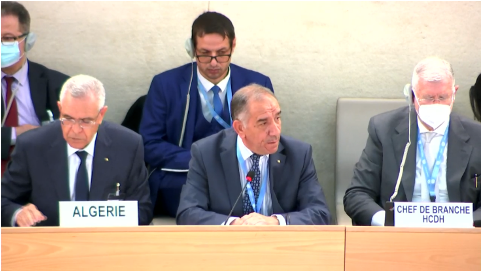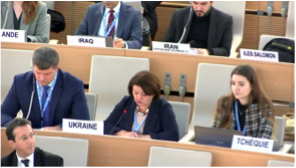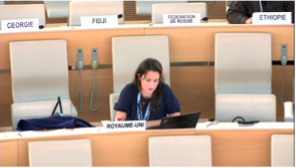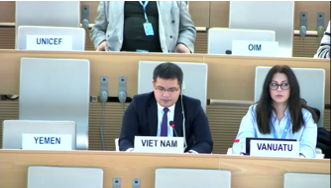The 41st Session of the Universal Periodic Review
7th November – 18th November
Algeria Review – 4th Universal Periodic Review
11th November 2022
By Bethany Morley / GICJ
Executive Summary
On the 11th of November 2022, during the 41st session of the Universal Periodic Review (UPR), the Human Rights Council and UN Member States met to conduct the fourth review of Algeria. The review is based on documents including the national report, the compilation of UN information, and the summary of stakeholder’s information in accordance with resolution 5/1.
 Firstly, the president of Algeria, Mr. Abdelmadjid Teboune, outlined the structure of the meeting. Explaining who constitutes the delegation and emphasising the participation of 10 women within the Algerian delegation. The Minister of Justice,Mr. Abderrachid Tabi, then opened the interactive dialogue.
Firstly, the president of Algeria, Mr. Abdelmadjid Teboune, outlined the structure of the meeting. Explaining who constitutes the delegation and emphasising the participation of 10 women within the Algerian delegation. The Minister of Justice,Mr. Abderrachid Tabi, then opened the interactive dialogue.
During the interactive dialogue, several concerns and issues were raised by participating delegations. The main issues coalesced around the country's overly broad definition of terrorism which is being used to justify imprisonment and impinge on the right to freedom of expression, the rights of minorities, women and girls and individuals with disabilities, reservations on ratifications and the death penalty. Though the country has shown progress since the previous UPR in 2017 there is an alarming number of reports of violations of fundamental human rights within Algeria.
Geneva International Centre for Justice (GICJ) welcomes the efforts of Algeria since the country's previous UPR. However, we remain concerned about reports of human rights violations still being experienced such as discrimination against minorities, women and girls and those with disabilities. We urge Algeria to cooperate with the delegations and corroborate the recommendations.
Background
In May 2017, during the 27th Session and 3rd Cycle of Algeria’s Universal Periodic Review, the recommendations for Algeria included: (1) The adoption of a comprehensive legal framework for refugees and asylum seekers, (2) the introduction of a National Action Plan (NAP) to tackle modern slavery, (3) the adoption of a comprehensive legal framework for minorities and indigenous peoples consistent with human rights, (4) the strengthening of the rights of persons with disabilities, and (5) the pursuit of efforts to tackle violence against women and give full and equal rights to women by withdrawing its reservation to CEDAW.
This is the 4th UPR for Algeria which will be following up on the recommendations made in the 3rd review.
Interactive Dialogue
Geneva, 11th November 2022. At the 41st Session of the Universal Periodic Review, an interactive dialogue took place between delegations regarding the human rights situation in Algeria.
The Minister of Justice, Mr. Abderrachid Tabi outlined how the meeting was being held in parallel to two events that Algerians have pride in. Firstly, the 60th anniversary of the country’s independence, and secondly, the 68th anniversary of the war of freedom and liberation. Additionally, he highlighted how the international report of the UPR presents all of Algeria’s achievements since the last UPR in May 2017. He noted that Algeria has since witnessed the Hirak movement on the 16th of February 2019, which was described as a ‘constitutional reference point’ that showed Algeria’s citizens’ commitment to the state.
Additionally, the Minister followed up on the accepted recommendations previously made by the delegations and shed light on the obstacles that hinder the full implementation of Human Rights within Algeria. For example, how freedom of expression and technological advancements can become a source of false information, which threatens the stability of democratic institutions, the economy and human rights which in turn can threaten the social fabric of countries.
Following the opening remarks given by Mr. Tabi, the floor was given to the delegations where Algeria faced critical questions by multiple delegations which coalesced around three main areas that the Minister of Justice, Mr. Abderrachid Tabi, had previously discussed in the opening remarks. Firstly, regarding Algeria’s commitment to Article 87 bis of the Penal Code which establishes an overly broad definition of terrorism. Due to the broadness of this definition, it is being used to justify the imprisonment of journalists, human rights defenders, and protestors when practising their right to freedom of expression.The second area of concern was regarding the country’s commitment to protecting the rights of women and girls, as Algeria is yet to fully commit to the Committee on the Elimination of Discrimination against Women (CEDAW). The country is therefore failing to protect women against gender-related violence and inhibiting their access to sexual and reproductive rights. Third, critical questions were asked about the rights, or lack thereof, that individuals with disabilities have in Algeria. Questions were raised about anti-discrimination legislation and the access those with disabilities have to healthcare and education. Lastly, Algeria has not yet abolished the death penalty which was noted by multiple delegations in the HRC.
 The ambassador of Ukraine extended its welcome to Algeria as a new member of the Universal Periodic Review. Though Ukraine acknowledges the steps made by the government, it recommended thatAlgeria ratify the Optional Protocol to the Convention Against Torture and the Second Optional Protocol to the International Covenant on Civil and Political Rights.
The ambassador of Ukraine extended its welcome to Algeria as a new member of the Universal Periodic Review. Though Ukraine acknowledges the steps made by the government, it recommended thatAlgeria ratify the Optional Protocol to the Convention Against Torture and the Second Optional Protocol to the International Covenant on Civil and Political Rights.
 The delegate of the United Kingdom welcomed Algeria’s stated commitment to its2020 Constitution to respect human rights. However, the UK noted how some legislation restricts or limits the rights of those within Algeria irrespective of the state's commitment. The delegation first recommended that Algeria ensures the right to freedom of religion or belief by providing greater clarity and support when registering as a religious minority to become a recognised association. Secondly, the delegation recommended that Algeria guarantee full freedom of expression and media without risk of prosecution. Third, the delegation recommended that when referencing Article 37 of the Constitution, legislation does not discriminate on the basis of gender.
The delegate of the United Kingdom welcomed Algeria’s stated commitment to its2020 Constitution to respect human rights. However, the UK noted how some legislation restricts or limits the rights of those within Algeria irrespective of the state's commitment. The delegation first recommended that Algeria ensures the right to freedom of religion or belief by providing greater clarity and support when registering as a religious minority to become a recognised association. Secondly, the delegation recommended that Algeria guarantee full freedom of expression and media without risk of prosecution. Third, the delegation recommended that when referencing Article 37 of the Constitution, legislation does not discriminate on the basis of gender.
The delegate of the United States of America recommended that Algeria repeal reservations of Article 87 bis of the Penal Code which established an overly broad definition of terrorism. The delegation also recommended that Algeria release human rights defenders held under these overly broad provisions. It was also recommended that Algeria cease harassment and imprisonment of journalists and human rights defenders and remove language criminalising actions that undermine national unity.
The delegate of Uruguay recommended that Algeria strengthen the country’s commitment to gender equality by lifting reservations on CEDAW. It also recommended that Algeria adopt legislation preventing violence against women and girls in line with the constitution. Finally, it advised that the government strengthen domestic law to ensure full respect for freedom of expression.
 The Vietnamese delegate applauded the work of the Algerian council. Two recommendations were made by the delegation. First, it recommended that Algeria continue to promote sustainable and economic development and raise the living standards of itspeople Second, it advised the government to continue to improve access to education and healthcare for those with disabilities.
The Vietnamese delegate applauded the work of the Algerian council. Two recommendations were made by the delegation. First, it recommended that Algeria continue to promote sustainable and economic development and raise the living standards of itspeople Second, it advised the government to continue to improve access to education and healthcare for those with disabilities.
The delegate of Argentina expressed three recommendations for Algeria. First, it advised the government to take the necessary measures to ratify the national convention to protect all persons from enforced disappearance. Second, it recommended that Algeria adopt the measures needed to fully align the definition of torture and domestic law with the Convention Against Torture and Other Cruel, Inhuman or Degrading Treatment or Punishment. Third, it recommended that the State ensure women and girls their right to health so they can exercise their sexual and reproductive rights.
The Australian delegate welcomed Algeria to the UPR process. However, the delegation expressed its concern that Algerians aren’t able to practise their right to expression, association, assembly and belief. It was recommended that Algeria take further measures to guarantee the rights of expression, association, assembly and belief and ensure Article 87 bis of the Penal Code cannot be used to justify the imprisonment of individuals. It was also recommended that Algeria formally abolish the death penalty and ensure women’s equal rights.
Concluding Remarks
Mr. Abderrachid Tabi thanked all delegations that took the floor. To the issues raised, Mr. Tabi reiterated the progress that Algeria has made thus far with the new Constitution that was introduced in 2020. Further, he noted that the state institutions strive to complete the best practices. However, no amount will ever complete the job as there will always be shortcomings.
The promotion and protection of human rights and fundamental freedoms while countering terrorism
Regarding terrorism, Mr. Tabi reiterated that Algeria believes this article to be in line with the Security Council resolutions. He claimed that there are no contradictions between the article and UN rules on the definition of a crime of terrorism and its objectives. Mr. Tabi emphasised that the international community is yet to reach a consensus on a single definition of terrorism. Furthermore, he emphasised how religion and ethnicity cannot be used to justify terrorism.
Gender-based violence
Algeria’s delegation emphasised how it has amended the penal code to criminalise all forms of violence against women. Furthermore, the 2020 Constitution protects women from all forms of discrimination and violence in the public sphere and in the professional and private spheres.
Death Penalty
In response to the death penalty, Mr. Tabi noted that Algeria has not carried out the death penalty in over 30 years. Though it can be handed down, there have been amendments to the catalogue of crimes that can be imposed.
Position of Geneva International Centre for Justice
𝐆𝐞𝐧𝐞𝐯𝐚 𝐈𝐧𝐭𝐞𝐫𝐧𝐚𝐭𝐢𝐨𝐧𝐚𝐥 𝐂𝐞𝐧𝐭𝐫𝐞 𝐟𝐨𝐫 𝐉𝐮𝐬𝐭𝐢𝐜𝐞 (𝐆𝐈𝐂𝐉) commends and supports the member states for the recommendations made to Algeria. We urge Algeria to cooperate with human rights mechanisms to review Article 87 bis of the Penal Code which establishes an overly broad definition of terrorism which is being used to justify the imprisonment of individuals who practise their right to freedom of expression. We call on Algeria to review those being held under such provisions. We are concerned with reports that women and girls’ access to their sexual and reproductive rights is inhibited and that levels of discrimination and violence against women are still rife. We urge Algeria to withdraw the country's reservations to CEDAW and implement a substantive framework to combat all forms of violence against women and girls and ensure their rights are protected. Furthermore, we strongly deplore the discrimination faced by those with disabilities. We urge Algeria to protect the rights of minorities and review its anti-discrimination legislation. Lastly, GICJ strongly suggests that Algeria prohibits the use of the death penalty, as it is not only a breach of the fundamental right to life but a breach of international standards that Algeria has committed to.
Human Rights Defenders, HRDs, Corruption, United Nations, UPR, Universal Periodic Review, Algeria, Geneva4Justice, GICJ, Geneva International Centre for Justice, Justice









